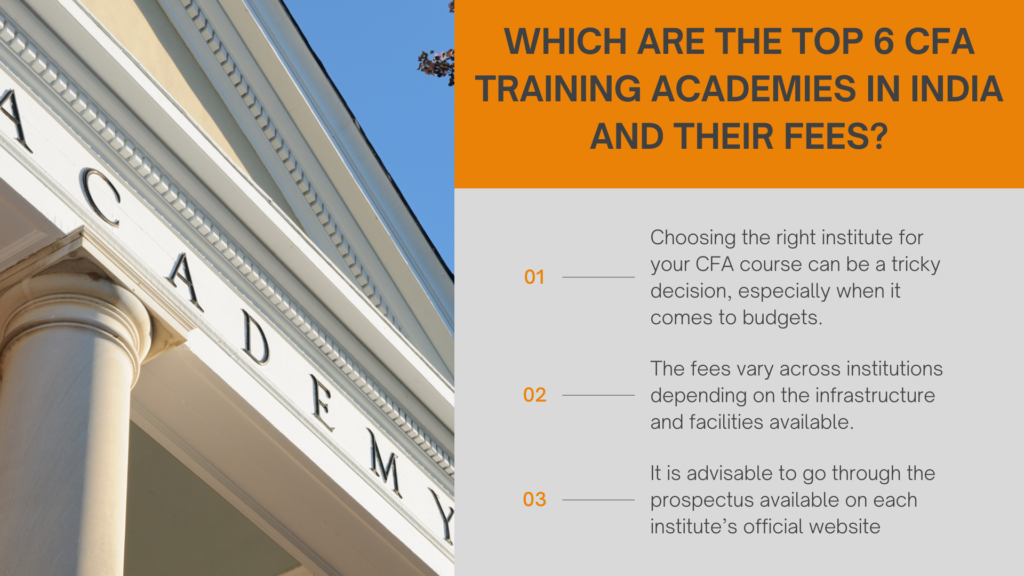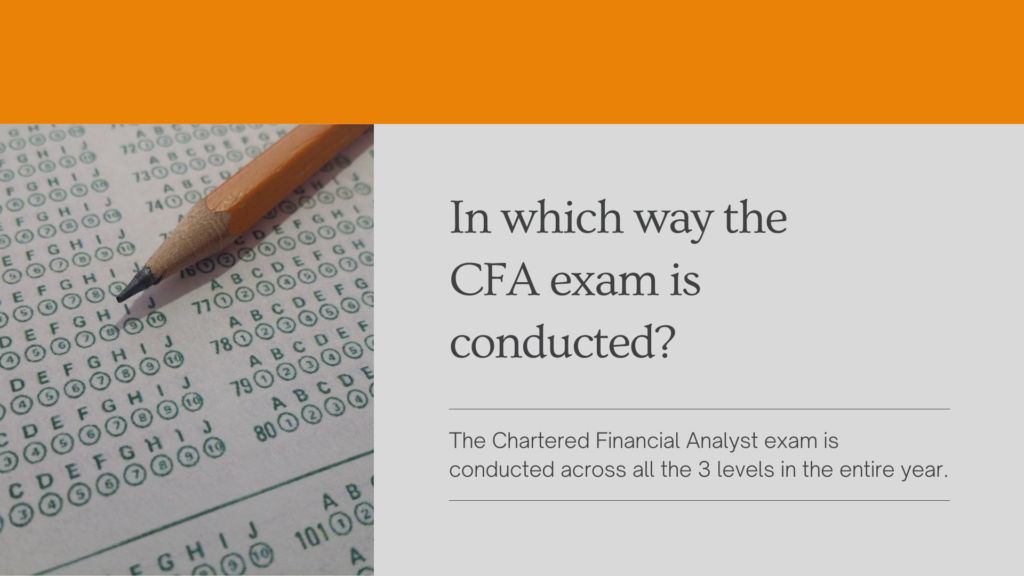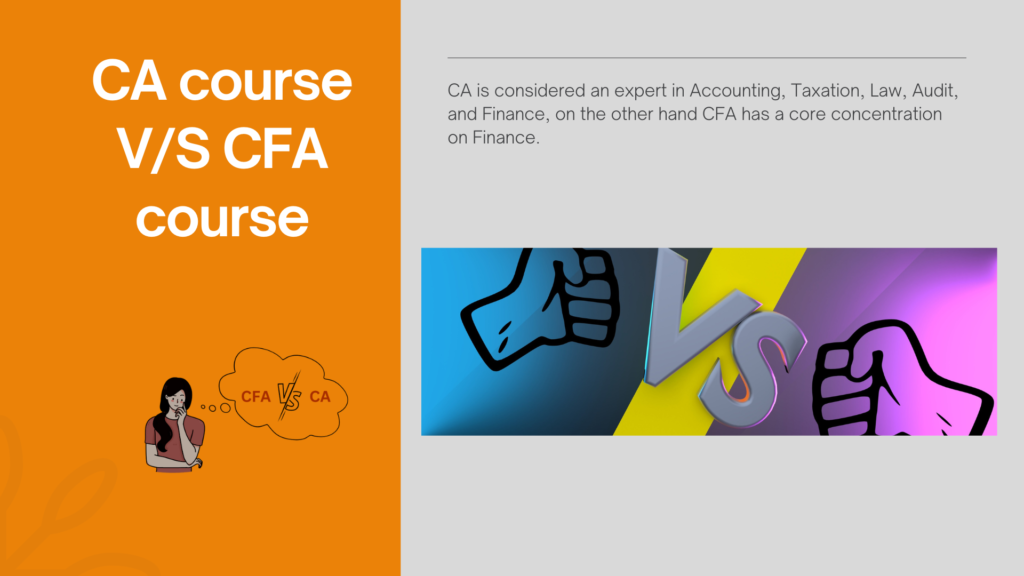What is CFA and what are the CFA course details?

CFA Course is one of the most sought-after and highly regarded professions in the world of finance. It has gained a reputation as a challenging program requiring hard work and dedication to master it. Attaining the CFA designation is a rigorous process that involves passing three levels of exams, with each level testing your knowledge, skill level, patience, and consistency.
Once you complete CFA course and become a CFA Charter holder, you will be welcomed into this field with numerous exciting opportunities and lucrative salary packages. Many companies employ CFAs for their extensive expertise in finance and assign them roles such as Portfolio Management, Consulting, Risk Management and more.
The CFA course is an invaluable asset for anyone who desires a career in the world of finance; it provides an unparalleled level of knowledge and experience not otherwise obtainable.
CFA course details
The CFA course comprises three levels, each consisting of an extensive six-hour exam. In order to receive the prestigious Chartered Financial Analyst credentials, candidates must pass all three exams. Each level is assigned a specific weightage, with the topics and investment tools becoming increasingly complex as the candidate progresses through the programme.
At Level 1, basic aspects of investment analysis are covered in ten topics that introduce the fundamental principles and tools used in investing.
Level 2, takes these concepts further by applying them to the valuation of various assets. Finally, at
Level 3, candidates must synthesise all previous knowledge in order to learn how to effectively plan for wealth and manage portfolios.
CFA Course: Core Topics
The CFA course is comprehensive, consisting of core topics that provide a thorough understanding of the investment market. These core topics include Ethical and Professional Standards, Economics, Quantitative Methods, Financial Statement Analysis, Equity Investments, Fixed Income, Corporate Issuers, Derivatives, Portfolio Management and Wealth Planning, and Alternative Investments.
Ethical and Professional Standards imparts knowledge on the importance of ethical behaviour and professional conduct in the investment industry. Economics covers microeconomic concepts such as markets frameworks and supply and demand analysis for individuals as well as firms.
Quantitative Methods focus on probability theory, investment decision making considerations, descriptive statistics and more. Financial Statement Analysis provides an in-depth look into financial reports along with their procedures and standards.
In CFA course Equity Investments involves studying indexes, security markets and equity investment areas of the economy. Fixed Income focuses on fixed income measurement techniques, maintenance factors that put it at risk and various types of fixed income securities. Corporate Issuers require gaining insight into stakeholder management and corporate governance.
Derivatives cover basics such as derivatives structure and the derivative market. Portfolio Management and Wealth Planning involve getting a comprehensive understanding of wealth planning and portfolio management. Finally Alternative Investments encompass concepts related to private equity funds, hedge funds, real estate investments as well as infrastructure investments.
CFA Course: Level-Wise Weightage
The CFA course is divided across three levels and the weightage of each topic is tabulated below. It should be noted that the CFA Institute may make adjustments to the CFA course depending on industry requirements and feedback from investment experts, with students being notified of any changes on the official website in advance.
Level 1 of the CFA course includes topics such as Ethical and Professional Standards (15%), Equity Investments (10%), Quantitative Methods (12%), Fixed Income (10%), Economics (10%), Derivatives (5%) Financial Reporting and Analysis (20%), Alternative Investments (4%), Corporate Finance (7%) and Portfolio Management and Wealth Planning (7%)
Level 2 of CFA course includes Ethical and Professional Standards (10-15%), Equity Investments (15-25%), Quantitative Methods (5-10%), Fixed Income (10-20%), Economics (5-10%), Derivatives (5-15%), Financial Reporting and Analysis (15-20%), Alternative Investments (5-10%), Corporate Finance (5-15%) and Portfolio Management and Wealth Planning (5-10%).
The highest weightage in Level 3 CFA course is given to Portfolio Management and Wealth Planning, which forms 40-55% of the syllabus. The other topics are Derivatives (5-15%), Alternative Investments (5-15%) and Financial Reporting & Analysis 10-20%), Ethical and Professional Standards (10-15%), Equity Investments (15-25%), Fixed Income (10-20%) and Economics (5-15%).
Note: It is important to note that the CFA Institute reserves the right to update or change the CFA course as needed in order to keep up with industry standards and suggestions from investment professionals. Any changes or updates will be communicated in advance on the official website.
Which are the Top 6 CFA training academies in India and their fees?

Choosing the right institute for your CFA course can be a tricky decision, especially when it comes to budgets. To help you in your search, here is a detailed list of the top 6 institutes offering CFA course in India along with their respective fee structures. The fees vary across institutions depending on the infrastructure and facilities available. Candidates are advised to go through the prospectus available on each institute’s official website to get complete information regarding their CFA course fees and other aspects before making a decision.
The following is the list of Top 6 CFA Training Academies in India and their fees:
- International College of Financial Planning, Lucknow – INR 40,000
- Shri Chimanbhai Patel Institute of Professional Training, Ahmedabad – INR 65,000
- Narayana Business School, Ahmedabad – INR 1,25,000
- International College of Financial Planning, New Delhi – INR 45,000
- Global Center for Entrepreneurship & Commerce (GCEC), Jaipur – INR 1,09,000
- Central India Institute of Management Studies (CIIMS), Nagpur – INR 50,500
The CFA course fees may differ depending on the Institute changing their fees pattern.
In which way the CFA exam is conducted?

The Chartered Financial Analyst exam is conducted across all the 3 levels in the entire year. The weightage in each level varies. The passing percentage across all levels is not much and is somewhere between 40 and 50%.
CFA Exam Pattern
The detailed exam pattern of CFA course is tabulated below:
The Chartered Financial Analyst (CFA) Level 1 exam is conducted in a computer-based format and is held across India during the months of February, March, May, June, July, August and November. To begin the registration process for the CFA Level 1 exam, candidates must first create an account on the official website by providing relevant information such as their preferred exam centre.
Candidates who wish to apply for scholarships must do so within the given time frame. Additionally, applicants are required to pay the application fee and exam fee online via debit or credit card, net banking or wire transfer. There are three deadlines for payment of fees – with the first one being the least expensive and the last one being most expensive. Furthermore, new candidates appearing for the CFA Level 1 exam for the first time are liable to pay a one-time enrollment fee of USD 450. Lastly, applicants must also read and accept the Candidate Agreement before continuing with their registration process.
It is administered as two separate, three-hour sessions. Each session has 90 multiple-choice questions, with topics ranging from quantitative methods, financial reporting & analysis, ethics & professional standards, economics, equity, derivatives, portfolio management, corporate finance and alternative investments. Candidates must answer each question within an average of 90 seconds.
In addition to the examination itself, candidates are also responsible for submitting a Professional Conduct Statement prior to their first CFA exam application and then annually before every subsequent exam registration. This statement requires details regarding any reprimands, investigations or litigations they may have been subject to in the past.
It is generally recommended to allocate 303 hours of study time in order to successfully pass the CFA Level 1 exam. Those who pass will receive their results approximately 2 months after the date of the exam.
The Chartered Financial Analyst (CFA) Level 2 exam is designed to evaluate an applicant’s ability to apply investment valuation concepts in a practical setting. This exam is divided into four sections, each covering around 10 topics ranging from Ethical & Professional Standards, Investment Tools, Portfolio Management & Wealth Planning.
The duration of this exam is 4.5 hours and the registration process is similar to that of the CFA Level 1 Exam. To register for the CFA Level 2 Exam, candidates are required to accept the Candidate Agreement and submit a Professional Conduct Statement without having to pay any application fee.
Results for the exam will be released approximately 60 days after the test date. It focuses on the valuation of different assets and requires candidates to apply investment tools and concepts in practical scenarios. The exam consists of 88 vignette-supported multiple choice questions, split into two sessions of 135 minutes each with an optional break in between.
Each vignette is followed by 4-6 multiple choice questions, each worth 3 points if answered correctly. On average, the passing rate for this exam is approximately 45%, meaning that candidates need to dedicate a minimum of 328 hours in a year in order to pass.
The Chartered Financial Analyst Level 3 exam is the final level to become certified as a Chartered Financial Analyst. This exam covers topics related to portfolio management and wealth planning, giving candidates the skills necessary to effectively manage financial investments. The exam is graded for 360 points, with one point per minute of duration, and has an allotted time span of 4.5 hours – divided into two halves.
In order to register for the Chartered Financial Analyst Level 3 exam, applicants must first fill out the registration form available on the Chartered Financial Analyst Institute’s official website. This form requires details such as education level, profession and employer information, including location. Additionally, applicants must accept the Candidate Agreement and submit a Professional Conduct Statement before being able to pay the fee via credit card, debit card or wire transfer.
Upon completion of this process, candidates will be registered for the exam and may proceed to prepare for it accordingly. The Chartered Financial Analyst (CFA) Level 3 exam is a 4.5 hour exam, divided into two sessions of 2 hours and 15 minutes each. During the first session, candidates are presented with 8-11 vignettes that require them to demonstrate their ability to integrate all the concepts and analytical methods found throughout the CFA course in order to effectively plan and manage wealth.
The second session consists of 44 multiple choice questions (MCQs), some of which may be essay type questions worth varying points. Answers must be typed into the provided text box, and each MCQ has 3 or more options from which to choose. The average passing rate for this exam is 54%, so it is recommended that those taking it dedicate a minimum of 344 hours per year in preparation.
What are the Job options after completing CFA course, their salary and the top CFA recruiters?

Chartered Financial Analysts (CFAs) are highly sought-after and their credentials are widely recognised on a global scale, providing them with the opportunity to work abroad and secure higher salaries than what is available in their home countries. Depending on the qualifications and experience of the candidate, CFAs typically earn anywhere between Rs. 3,00,000 and Rs. 12,00,000 per annum at the start of their career. The Chartered Financial Analyst Course Fee is also relatively affordable in comparison to other industry courses.
Amongst some of the highest paying CFA job roles are Risk Manager, Private Banker and Investment Manager; each having its own distinct set of tasks and responsibilities. Risk Managers typically assess financial risks that a company may face and develop solutions to mitigate them; Private Bankers help clients manage accounts whilst also promoting their bank’s various financial services; Investment Managers provide guidance on investments such as mutual funds, bonds and stocks. The job options for CFA are vast, with a wide range of salaries and top recruiters. A Certified Financial Analyst (CFA) can become a Chief Executive Officer (CEO), Chief Financial Officer (CFO), Chartered Financial Analyst (CFA), Business Consultant, Market Research Analyst, or Portfolio Manager.
A CFA CEO is tasked with managing the financial decisions of a company, while the CFO professional is responsible for overseeing the entire financial resources and budgets of an organization, analyzing associated risks and opportunities, and providing guidance to subordinates. A Chartered Financial Analyst provides guidance regarding financial decisions such as tracking stock performances and investment management. They also research and monitor the financial position of their clients.
Business Consultants are involved in various aspects of business operations such as marketing, operations, finance and accounting, and marketing. Additionally, they analyze the overall effectiveness of a business. Market Research Analysts collect data from customers, competitors, etc., taking inventory of market conditions to provide decision-makers with actionable information. Lastly, a Portfolio Manager creates and manages investment portfolios for clients while striving to understand market trends to maximize returns on investments.
Chartered Financial Analyst Salary
The Chartered Financial Analyst (CFA) designation is one of the most sought-after credentials in the financial services industry, and it comes with many attractive opportunities for employment. This article provides an overview of some of the best jobs and salary packages offered to CFA certificate holders. The salaries associated with each job may vary depending on factors such as prior work experience or skill set.
Risk Manager: CFA-certified risk managers receive a very competitive annual salary, with an average of INR 10,00,000 LPA (Lakhs Per Annum). This role involves managing the risk associated with investments, which requires a great deal of expertise and knowledge.
Private Bankers: Private bankers typically earn an average salary of INR 9,00,000 LPA. These professionals are responsible for providing personalized banking services to high net worth clients and helping them manage their finances effectively.
Investment Manager: Investment managers have an average salary package of INR 7,00,000 LPA. Investment managers analyze financial data to identify investment opportunities based on their clients’ goals and objectives.
Chief Executive Officer: A CEO’s salary is much higher than that of other CFA-certified professionals, with an average income of INR 41,00,000 LPA. CEOs are responsible for overseeing all aspects of a business’s operations and leading strategic initiatives.
Chief Financial Officer: Chief Financial Officers (CFOs) earn an average annual salary of INR 43,00,000 LPA. They are responsible for managing the finances and operations of their organization by overseeing budgets and investments as well as developing strategies to maximize profitability.
Chartered Financial Analyst: Those who possess a CFA course certification can expect to earn an average annual salary of INR 9,50,000 LPA in this capacity. CFAs typically provide advice on financial planning strategies such as investments or retirement planning to individuals or organizations.
Chartered Financial Analyst Top Recruiters
The Chartered Financial Analyst (CFA) qualification is an increasingly sought-after credential in the finance and accounting industries, with jobs and salaries on the rise. It is a widely respected certification program that provides its holders with a comprehensive understanding of investment analysis, portfolio management and other financial topics. As such, employers are keen to hire professionals with CFA expertise and the right skill set.
Some of the top recruiters in this field include SBI Bank, Emami Agrotech Ltd., ICRA, Credit Suisse, Crisil, Citigroup, PwC, Axis Bank, JP Morgan & Co., HDFC Bank, Bharti Airtel, Deloitte, HSBC, Goldman Sachs Group Inc., ITC, Ernst & Young , ICICI Bank , Hindustan Unilever Ltd., Aditya Sun Life and Reliance Industries Ltd. All of these organisations understand the value of hiring CFA-qualified professionals and offer competitive salaries to those who possess this high level qualification.
Each organisation has its own recruitment process for CFA qualified candidates which may involve written tests or interviews to assess their knowledge and suitability for the role. With so many top recruiters looking for CFA experts to join their teams it’s no wonder that Chartered Financial Analyst jobs are increasing in popularity.
What is the eligibility criteria for CFA and how to apply for CFA course?

The CFA course has specific eligibility norms that must be met if one wishes to pursue this course. First and foremost, a recognized bachelor’s degree or equivalent qualification in Commerce is required from the candidate. Additionally, those who are in their final year of studies can also register for the CFA course Level 2 examination, provided they successfully complete their graduation before the date of registration.
In terms of work experience, candidates should have a minimum of 4000 hours or a combination of 4000 hours or more gained through higher education over 3 consecutive years before registering for the CFA course Level 1 examination. Internships or articleships paid in nature are also accepted as a form of work experience even if it is not related to the investment market.
Other prerequisites include having key skills such as business communication, critical thinking and problem solving abilities, along with strong leadership qualities, team-oriented attitude, timely management skills and professional judgement. Lastly, an international passport and fluency in English language is mandatory for taking up this course.
CFA Course Admission Process
The CFA course has specific eligibility norms that must be met if one wishes to pursue this course. First and foremost, a recognized bachelor’s degree or equivalent qualification in Commerce is required from the candidate. Additionally, those who are in their final year of studies can also register for the CFA course Level 2 examination, provided they successfully complete their graduation before the date of registration.
In terms of work experience, candidates should have a minimum of 4000 hours or a combination of 4000 hours or more gained through higher education over 3 consecutive years before registering for the CFA course Level 1 examination. Internships or articleships paid in nature are also accepted as a form of work experience even if it is not related to the investment market.
Other prerequisites include having key skills such as business communication, critical thinking and problem solving abilities, along with strong leadership qualities, team-oriented attitude, timely management skills and professional judgement. Lastly, an international passport and fluency in English language is mandatory for taking up this course.
What is the difference between CA course and CFA course?

Focus
CA is considered an expert in Accounting, Taxation, Law, Audit, and Finance. It is a multidisciplinary course that requires a comprehensive understanding of various aspects of finance and business.
CFA has a core concentration on Finance. It covers topics such as Equity Valuation, Fixed Income Analysis, Portfolio Management, and more.
Area
CA course is an Indian Recognised course organized by the Institute of Chartered Accountants of India (ICAI). The qualification is recognised worldwide.
CFA course is a globally recognized course organised by the CFA Institute. It has its own set of standards and qualifications which are respected worldwide.
Duration of the Course
CA course is divided into three levels along with 3 years of Practical Training which then requires a minimum of 4.5 years after 12th grade. During this time students will develop their knowledge and skills to become proficient in various aspects of accounting and finance.
CFA course duration is also divided into three levels, along with 4 years of practical training experience, which requires a minimum of 4 years after graduation from university or college level education to qualify for the exam. This includes a broad range of topics related to investment analysis, portfolio management and other financial services areas that require extensive knowledge and understanding from candidates.
Pass Percentage
CA course is considered one of the toughest courses throughout the world with an average passing percentage estimated at 0.5%. Moreover, it has been believed that only 5 out of 1000 entrants can qualify for the CA Final exam due to its complexity and difficulty level.
The passing percentage for CFA tends to be higher than CA with an average success rate estimated at 10%. This means 100 students are able to qualify out 1000 entrants into the course due to its multiple choice question based paper pattern which involves some luck factor in addition to rigorous studying and preparation beforehand.
Demand
Naturally, demand for CAs tends to be higher due to their exclusive authority to audit Financial Statements and other related documents within companies; thus making them highly sought-after professionals.
On the other hand, many national and multinational companies are looking for well-versed CFA candidates who can handle their finances effectively and consequently bring stability to their investments and other financial decisions they make within their respective organizations.
Exam Pattern
CA course- Candidates receive the benefit of taking their exams over 16 days with 1 day of preparation per paper. This gives students the opportunity to spread out their studies and prepare for each subject gradually, making for a more manageable process overall.
CFA course- Exams require students to prepare all 10 subjects in one day, making it a much more challenging endeavor due to the time constraints.
Salary in India
In terms of salary opportunities in India, the average package for a fresher CA is typically between 6-7 lakhs, increasing depending on work experience and performance. For CFAs, the average earnings for freshers is estimated at around 4 lakhs, although this figure can increase with more experience and higher levels of proficiency.
Conclusion
It is highly advisable to pursue the Chartered Financial Analyst (CFA) course due to its immense global demand and value. The CFA program is designed to equip individuals with the knowledge and skills required for an in-depth understanding of financial markets and investments. The program consists of three levels of examinations, each emphasizing different aspects of investment analysis and portfolio management. Upon completion, successful candidates are awarded the CFA charter, which provides a competitive edge in the job market and recognition of their expertise in finance and investment. Therefore, pursuing a CFA course is a smart career move that will help you stand out from your peers in the field of finance.
Frequently Asked Question
The average pay for a Chartered Financial Analyst gets after completing CFA course in India is an impressive ₹7,00,000 per annum. This is higher than the average salary of many other professional roles and reflects the importance of having a CFA certification in the finance industry.
A CFA course is a globally recognized qualification and it can open up many new opportunities, from lucrative positions in banking and investment companies to high-level consulting roles. With its focus on corporate finance, portfolio management and financial analysis, having a CFA certification can be a great way to progress in your career.
When it comes to deciding between a CFA course and an MBA course, it’s important to consider the differences between the two. A traditional MBA program covers a wide range of topics such as management, marketing, and strategy, while the CFA course is more focused on investment management. Therefore, the best choice for you will depend on your career goals within finance.
If you’re looking for a greater understanding of investment management and portfolio construction, then the CFA course would be the right choice for you. However, if you want exposure to a more comprehensive suite of business skills, then an MBA could be more beneficial. Ultimately, it’s important to carefully weigh the pros and cons of each option to determine which one is best suited to your needs and ambitions.
The CFA courses are renowned for their rigorous difficulty, requiring a great deal of dedication and determination to complete successfully. In order to pass, candidates should aim to study for no less than 300 hours, using a combination of official and alternative preparation materials such as practice questions and video tutorials to build a comprehensive knowledge base.
Additionally, it is highly recommended that they devise a structured study plan that outlines the topics they need to cover in order to stay on track with their studies. This not only helps them keep track of their progress but also provides them with an easy way to identify any areas where they need further improvement.
The demand for Chartered Financial Analysts (CFA) is continuing to rise in the future, particularly in India which is currently the world’s 3rd largest market for the profession.
In recent years, the Indian economy has experienced significant growth, leading to an increased need for CFA professionals to help manage investments and financial portfolios. With more businesses and individuals needing guidance on their finances, there is a growing demand for CFA professionals who are able to give accurate advice and analysis.
Additionally, as technology continues to become more integrated into financial services, CFA professionals are needed to ensure that investments remain profitable and secure. As such, this trend of increasing demand for CFAs is expected to continue into the foreseeable future.
When it comes to choosing a career in finance, one may be wondering which option is better: Chartered Accountancy (CA) or Certified Financial Analyst (CFA). Although CFA is widely accepted and respected globally as a top choice in the field of finance, CA remains the most sought-after certification in India.
This is because CA offers more job opportunities and recognition within domestic markets, with many leading companies and financial services institutions requiring candidates to have their CA certification. Furthermore, since India has a unique taxation system compared to other countries, many employers prefer candidates who have a thorough understanding of Indian laws and regulations. Thus, for those looking for an exciting career in finance within India, Chartered Accountancy would be the ideal option.
The CFA course has seen a surge in demand in India over the past few years. This is evidenced by the fact that the number of CFA’s in India has grown at a rate of 30% for the past 7 years, making India the third largest market for CFA, behind only China and USA.
The increased popularity is likely due to the recognition and respect that come with completing this rigorous credentialing process, as well as the opportunity to work in a variety of industries. As such, CFA’s are highly sought after by businesses seeking experienced financial professionals to help them navigate complex markets and make informed decisions.
The average salary of a Chartered Financial Analyst (CFA) in India is dependent on several factors such as experience, location, and the industry. Generally speaking, entry-level positions for CFA’s typically range from ₹450,000 to ₹800,000 per annum.
As an individual’s experience increases and they take on more responsibility within their role, the salary potential can increase to up to ₹2 million or more annually depending on the employer. Furthermore, salaries may vary by region or city as salaries tend to be higher in metropolitan areas due to a higher cost of living.
Additionally, salaries for CFA’s also differ based on the industry with financial services typically offering higher pay than other sectors.





